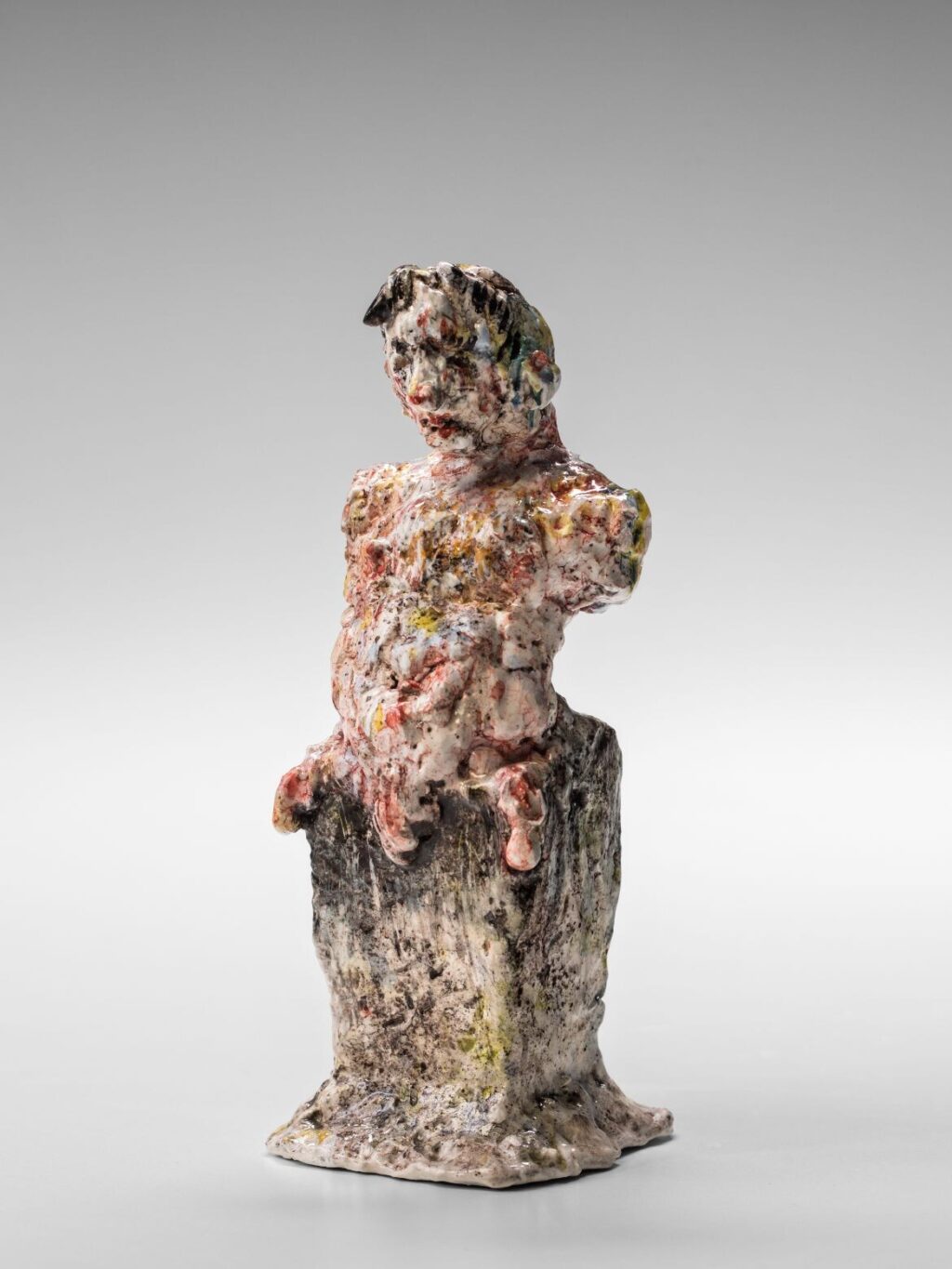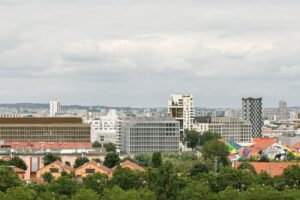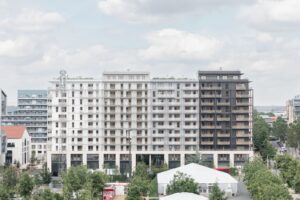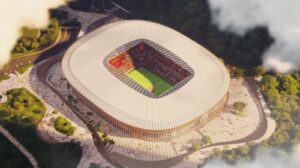Fantastic forms and the possibilities of materiality at Bundanon’s latest exhibition
Amidst the already fantastic architectural forms of Bundanon – the 1000 hectare site on the NSW South Coast that was gifted to the Australian people by Arthur and Yvonne Boyd – the latest exhibition is adding new layers of richness to the site. ‘Fantastic Forms’ features work by Nabilah Nordin, Rubyrose Bancroft and Stephen Benwell, three artists who are exploring materials in very different ways.
The thread that ties them together in this exhibition is the connection with Merric Boyd, father of Arthur. Curator Sophie O’Brien has invited each artist to respond to a selection of Merric’s drawings, of which there are thousands in total. This approach, just like the architecture at Bundanon, immediately makes the exhibition site specific and grounded in the past. More specifically, it puts that history into conversation with the present.
“History here is not relegated to being either sacred or far away. It’s with us in material form, but also in the way that the Boyds have structured the purpose of our organisation. It doesn’t focus on art – it focuses on artists, which is about production, making, thinking and research. It’s about the process rather than the final outcome,” says O’Brien.
This focus on the artistic process makes it enigmatically difficult to call the forms of this exhibition by their right names. Benwell works with ceramics to create detailed and mysterious figures that he describes as statues, despite their small scale. Bancroft captures some of the playfulness of Merric’s sketchbook with her ‘claymation’, at once exploring material possibilities and visual storytelling. Nordin, meanwhile, is more obviously working as a sculptor but in such a way as to question the distinction between sculpture and plinth, as well as fully engaging the lofty spaces of the gallery.
“I respond to architecture and the context of the space that I’m working in,” explains Nordin, whose work clearly enters into a dialogue with the largest exhibition room with its plinths of stage- and column-like scales. “With ‘Smoke Chain’, my first large-scale bronze sculpture, I wanted to explore the possibilities of material transformation.” Other works on show, meanwhile, “celebrate an overabundance of colour and movement, as well as an exaggeration of proportions.”
Nordin underlines her general approach: “My practice is concerned with the possibilities of materiality – what can a material do, how can it behave, what are its constraints and how can it perform?”
From the 1866 homestead and Glenn Murcutt’s 1999 education centre to the stunning architecture of Kerstin Thompson Architects’ bridge, inspiration comes in many different forms at Bundanon. It is no surprise, then, that materiality – and specifically different types of material exploration – are at the heart of this latest exhibition.
“The principle of Bundanon is that we’re working across different media – visual arts, performing arts, writing, film and so on. Of course, Merric himself and the Boyd family as a whole did multiple things in multiple media and that’s where our approach comes from,” says O’Brien. “The form isn’t as important to the Boyd’s as the idea, so that allows us to play with those types.”
O’Brien explains the context and legacy further: “Arthur Boyd talked about wanting to make Bundanon a place where the Australian public can engage with artists and that’s a point of difference for us.”
‘Fantastic Forms’ taps into all of the above: the public engaging with art as process (including sculpture workshops and other community events), artists in conversation with the Boyds, the present in dialogue with the past. Bundanon, as a richly layered and historic regional site of national significance, is a fitting location to tie it all together.
The post Fantastic forms and the possibilities of materiality at Bundanon’s latest exhibition appeared first on Habitusliving.com.

Amidst the already fantastic architectural forms of Bundanon – the 1000 hectare site on the NSW South Coast that was gifted to the Australian people by Arthur and Yvonne Boyd – the latest exhibition is adding new layers of richness to the site. ‘Fantastic Forms’ features work by Nabilah Nordin, Rubyrose Bancroft and Stephen Benwell, three artists who are exploring materials in very different ways.
The thread that ties them together in this exhibition is the connection with Merric Boyd, father of Arthur. Curator Sophie O’Brien has invited each artist to respond to a selection of Merric’s drawings, of which there are thousands in total. This approach, just like the architecture at Bundanon, immediately makes the exhibition site specific and grounded in the past. More specifically, it puts that history into conversation with the present.
“History here is not relegated to being either sacred or far away. It’s with us in material form, but also in the way that the Boyds have structured the purpose of our organisation. It doesn’t focus on art – it focuses on artists, which is about production, making, thinking and research. It’s about the process rather than the final outcome,” says O’Brien.
This focus on the artistic process makes it enigmatically difficult to call the forms of this exhibition by their right names. Benwell works with ceramics to create detailed and mysterious figures that he describes as statues, despite their small scale. Bancroft captures some of the playfulness of Merric’s sketchbook with her ‘claymation’, at once exploring material possibilities and visual storytelling. Nordin, meanwhile, is more obviously working as a sculptor but in such a way as to question the distinction between sculpture and plinth, as well as fully engaging the lofty spaces of the gallery.
“I respond to architecture and the context of the space that I’m working in,” explains Nordin, whose work clearly enters into a dialogue with the largest exhibition room with its plinths of stage- and column-like scales. “With ‘Smoke Chain’, my first large-scale bronze sculpture, I wanted to explore the possibilities of material transformation.” Other works on show, meanwhile, “celebrate an overabundance of colour and movement, as well as an exaggeration of proportions.”
Nordin underlines her general approach: “My practice is concerned with the possibilities of materiality – what can a material do, how can it behave, what are its constraints and how can it perform?”
From the 1866 homestead and Glenn Murcutt’s 1999 education centre to the stunning architecture of Kerstin Thompson Architects’ bridge, inspiration comes in many different forms at Bundanon. It is no surprise, then, that materiality – and specifically different types of material exploration – are at the heart of this latest exhibition.
“The principle of Bundanon is that we’re working across different media – visual arts, performing arts, writing, film and so on. Of course, Merric himself and the Boyd family as a whole did multiple things in multiple media and that’s where our approach comes from,” says O’Brien. “The form isn’t as important to the Boyd’s as the idea, so that allows us to play with those types.”
O’Brien explains the context and legacy further: “Arthur Boyd talked about wanting to make Bundanon a place where the Australian public can engage with artists and that’s a point of difference for us.”
‘Fantastic Forms’ taps into all of the above: the public engaging with art as process (including sculpture workshops and other community events), artists in conversation with the Boyds, the present in dialogue with the past. Bundanon, as a richly layered and historic regional site of national significance, is a fitting location to tie it all together.
The post Fantastic forms and the possibilities of materiality at Bundanon’s latest exhibition appeared first on Habitusliving.com.





